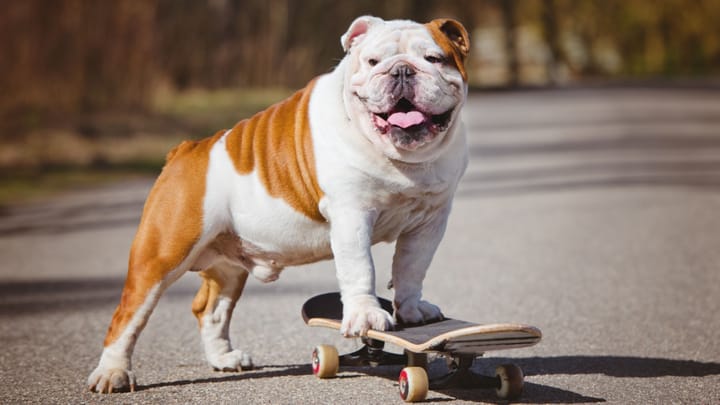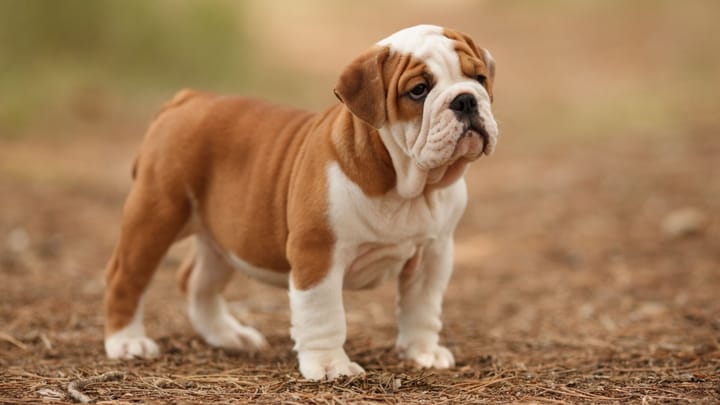Bulldog
Other name: English Bulldog


The English Bulldog is an unusual dog, both in terms of physical characteristics and temperament. They're not very active dogs, but that doesn't mean they should lead a sedentary lifestyle. Bulldogs are very friendly with their family members. Loyal, protective, and courageous when necessary, they make wonderful companions. Their expression gives them a grumpy look - but on the inside, they are the happiest of pups!
|
Life expectancy |
The Bulldog has a life expectancy of between 8 and 10 years |
|
Temperament |
|
|
Size |
Medium
|
|
Adult size |
Female
Between 12 and 16 in
Male
Between 12 and 16 in
|
|
Adult weight |
Female
Between 46 and 55 lb
Male
Between 51 and 60 lb
|
|
Coat colour
The coat can be unicolour (beige, pure white, etc.) or sooty (with black face/snout). Red (from pale fawn to darker fawn), brindle, and mixed (combination of white with another colour) are also accepted colours. On the other hand, black, black and tan, liver and Dundley are not accepted. |
White Sand Blue |
|
Type of coat
His hair is short. His fur is thin, tight and smooth. |
Short |
|
Eye colour
Very dark in colour, the eyes are almost black. |
Brown
|
|
Purchase price |
The Bulldog costs between £1460 and £1700 |
The English Bulldog does not know how to swim and he tends to sink. In fact, his short legs do not allow him to swim fast enough to keep his body on the surface of the water. And even if some Bulldogs manage to swim, it fatigues them too much and they eventually give up by letting themselves drift. The wearing of a life jacket is therefore indispensable in case of walks in the vicinity of a body of water.
More details about the Bulldog
Bulldog: Origins and history
He comes from combat dogs used in the Medieval Age against bulls, hence his name. He is the result of a selection that aimed to create a dog with a powerful bite, very fierce and courageous, insensitive to pain. This unhealthy selective breeding regime, which sought to produce only "war machines", was due to be eradicated due to his great ferocity. Thus, the English Bulldog was almost extinct until a group of breeders took an interest in him and began to work on his personality by eliminating any traces of aggression. Today the English Bulldog is a very friendly, sweet and quite balanced companion dog.
Physical characteristics of the Bulldog
The English Bulldog is a very peculiar, stout, and powerful dog, with short legs, and an astonishingly large head compared to his size. The skull has very pronounced wrinkles. The muzzle is short and crushed. The eyes are round, medium-sized, located low on the skull and well exposed. The ears are small and rose-shaped. The teeth are projected forwards, with a lower jaw that juts forward.
Bulldog: Characteristics
Bulldog: Behaviour
Training a Bulldog
This hound may be difficult to motivate but when you have his attention, he is rather docile. On the other hand, if he perceives confusion or unfairness in the attitude of his master, then he may express his disapproval.
Education should be initiated as soon as you get an English Bulldog puppy to prevent him from learning bad habits.
As he may have a thick head on occasions, any training exercises will have to be repeated regularly and in the most positive way possible, but with a dose of firmness. The sessions should be short to prevent the loss of the dog’s concentration and to guarantee success.
Teaching him to be alone is recommended to prevent this dog from stressing as long as you don’t push your luck with long absences.
Walking on a leash without pulling will also require a swift star to the learning process if you want walks to be enjoyable, both for the master and for the dog.
Bulldog: Lifestyle
Breed compatibility Bulldog
Bulldog: Purchase price
The price of an English Bulldog varies depending on his origins, age and gender. It is between £1460 and £1700 for a dog registered with the KC. The high prices are generally justified by the titles won by the breeding parents at dog shows.
The average monthly budget ranges from £35 and £45 in order to fully meet the needs of this dog, including conventional food and care.
Bulldog: Shedding
Light
Weekly brushing is necessary to remove the dog's dead hair, especially during moulting periods when the loss is more abundant.
Bulldog: Grooming
The maintenance of the English Bulldog’s short hair is not particularly complicated, you just need to monitor his skin because of its folds.
His eyes are also very delicate, so just observe them and clean them regularly to prevent irritation. Do the same for his ears.
Bulldog: Health
The life expectancy is estimated at 9 years.
Particularly sensitive to temperature changes, the English Bulldog is very fragile when facing extreme climates. In addition, his low endurance makes him prone to suffering breathing problems. Finally, he can be affected by many health problems.
He is very sensitive to heat because of his short coat. In summer, he should not come out if it is too hot
The cold can cause violent shivering in the English Bulldog, so it is advisable to limit excursions when the temperatures are too cold. His coat will not provide enough protection during winter walks
Obesity in this bulldog is not uncommon and it should not be underestimated on the pretext that he is such an energetic dog. His low need to spend energy and his predilection for gluttony are not really compatible, so it is important to pay attention to his diet.
- Cancers and tumours (aortic chemodectomas, cutaneous lymphoma, localised mastocytoma, etc.)
- Heart disease (CIV, aortic stenosis, pulmonary, etc.)
- Skin diseases (generalized Demodicosis, cyclic follicular dysplasia, folliculitis, Pod-dermatitis, etc.)
- Hypothyroidism
- Congenital cleft palate (malformation that prevents a link between the oral cavity and the nasal cavity)
- Type A Haemophilia
- Kidney stones
- Distichiasis (Ocular affection)
- Retinal dysplasia
- Ectropion/Entropy
- Dry Kera-conjunctivitis (desiccation of the cornea and conjunctiva)
- Dislocation of the nictitating gland
- Hip dysplasia
- Patella dislocation
- Osteochondrosis (anomaly during growth)
- Eosinophilic (bone marrow damage during growth)
- Rupture of the crossed ligaments
- Diseases of the respiratory system (tracheal hypoplasia, brachycephalic syndrome)
- Cryptorchidism (a testicle fails to drop)
- Vaginal hyperplasia










